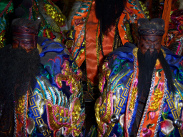A bio-bibliographical note on MM and China
Kant and Chinese Literati Landscape Painting
Confucian, Neo-Confucian and Post-Confucian
MM’s China
Excelling
Engendering
MM’s Revolution
The above four titles are about China and Chinese culture: a pamphlet, MM’s China; two books, Excelling and Engendering; plus MM’s Revolution (parts of another). Mention will be made, with links to their index pages, of three more books, in the HERA sequence, one in print, two published on MM's web, all three based upon dynastic types of Chinese literati landscape painting. They bring to eight the total of MM’s works concerned with China.
(Compare his seven works concerned with India, including the same three in the HERA sequence, which are also grounded in the triple manifestation of Shiva, Vishnu and Brahma known as the Trimurthi; the earlier Realization, which interweaves excerpts from the Upanishads, the Dhammapada and the Gita; the later Happening; plus Bangalore Esightings, a pamphlet which, like MM’s China, is a part of Life, the final book of the Sentence).
In 2007 Professor Morrison accepted an invitation from the Graduate Institute for Southeast Asian Studies of Peking University to deliver a commissioned lecture. (See the text of “Analogies between Southeast Asia and Western Europe,” on the Lectures page, where one may also view MM lecturing in Saigon on Chinese Painting.) From Bangkok he flew to Chengdu, revisiting an earlier scene of writing in Excelling; continued on to Shanghai, where he had written yet other scenes in Excelling (and at whose International Art Fair he had earlier represented a Korean gallery); then left for Beijing, where he spent a week on campus with his colleagues, including the acting head of the Institute, Professor Pei Xiaorui. Chengdu in the interval since 1992 had changed tremendously. A new six-lane highway in from the airport provided the prospect of many new multi-story buildings, which also filled the inner city. Shanghai too continued to flourish, the neighborhood of the exhibition hall barely recognizable from three years earlier. This trip provided MM with his first experience of Beijing, which he describes, along with Chengdu and Shanghai, in MM’s China.
Excelling recounts a trip from Hong Kong to Shanghai, then describes
the latter city, followed by Congqing; a trip up the Yangzi; then Chengdu,
Kunming, and Guangzhou. Completed in 1992, this book did not see publication
till 2001, as part of Scenes from the Planet (Delhi: Sterling).
Engendering interweaves Confucian
Analects and selections from the Dao De Jing (which Morrison earlier introduced
into a course concerned with universal poetic and philosophical texts) among
scenes of life in Norman, OK (USA). First edition: Norman, 1990; second
edition: Taipei, 2002.
Revolution, a twelve-chapter novel, co-authored with Dan Boord,
published in Taipei, 1985, includes Ancient China among its four settings. Five
of its chapters, in English and in Chinese translation, include three of those
settings. MM’s Revolution appeared in Taipei, 1998.
Particular and Universal: Essays in Asian, European
and American Literature (Taipei, 1999) includes essays on, inter
alia, Whitman’s Hindu element; poetry and philosophy in Lao-zi; and the
Buddhist element (with Chinese citations) in various Modernist poets, Irish and
American.
Work based on Chinese ink brush landscape art
All (first published in Scenes from the Planet), which imitates the literati masters of the Ming;
Regarding (published on MM's web), which imitates the great masters of the Northern Sung; and
Exists (also published on MM's web), which imitates the vivaciously original masters of the Yuan.
Photo essays
 MM’s China
MM’s China Scenes from the Planet: In, All,
Excelling, Or, Divine (Sterling)
Scenes from the Planet: In, All,
Excelling, Or, Divine (Sterling) Engendering (Cosmos Culture)
Engendering (Cosmos Culture) Revolution (Bookman Books)
Revolution (Bookman Books) MM’s Revolution (East & West)
MM’s Revolution (East & West) Révolution
Révolution Selected Poems
(from Sleep, O, Light,
A, Second, Her) (Sing Guang)
Selected Poems
(from Sleep, O, Light,
A, Second, Her) (Sing Guang) Particular and Universal: Essays in Asian, European and American Literature (Crane)
Particular and Universal: Essays in Asian, European and American Literature (Crane)
